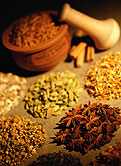
WEDNESDAY, May 27, 2015 (HealthDay News) — People who get a lot of fiber in their diet may be lowering their odds for type 2 diabetes, new research shows.
“We are not certain why this might be, but potential mechanisms could include feeling physically full for longer, prolonged release of hormonal signals, slowed down nutrient absorption, or altered fermentation in the large intestine,” wrote study author Dagfinn Aune, a Ph.D. student affiliated with the Imperial College London in England.
His team, which published the findings May 26 in the journal Diabetologia, looked at data on more than 29,000 Europeans tracked for an average of 11 years.
Those with the highest amount of fiber in their diet (more than 26 grams a day) were 18 percent less likely to develop type 2 diabetes than those with the lowest fiber intake (less than 19 grams a day), even after Aune’s team accounted for other dietary and lifestyle factors.
Obesity — a known risk factor for type 2 diabetes — was key, however. The researchers said that when a person’s body-mass index (BMI) — an estimate of body fat based on height and weight — was accounted for, the benefits of a high-fiber diet in warding off diabetes disappeared.
This suggests the dietary fiber may aid people by helping them maintain a healthy weight, which in turn lowers their risk of developing type 2 diabetes, the researchers said. The study only uncovered a link between a diet high in fiber and reduced diabetes risk, however; it did not prove cause-and-effect.
Still, when the researchers focused on specific types of fiber, they found that people who consumed the highest amounts of cereal and vegetable fiber were 19 percent and 16 percent, respectively, less likely to develop type 2 diabetes than those who consumed the lowest amounts of these types of fiber.
Cereals accounted for 38 percent of total fiber intake in the study, and were the main source of fiber in all countries except France, where vegetables were the main source of fiber.
Consumption of fruit fiber was not associated with a lower risk of diabetes, the study found.
The researchers also analyzed the findings of 18 other studies from the United States, Europe, Australia and Asia. That analysis also found a lowering of type 2 diabetes risk as daily intake of fiber increased.
“Taken together, our results indicate that individuals with diets rich in fiber, in particular cereal fibre, may be at lower risk of type 2 diabetes,” Aune, who is also affiliated with the Norwegian University of Science and Technology, said in a journal news release.
He believes other mechanisms may be at work as well, “for instance improving control of blood sugar and decreasing insulin peaks after meals, and increasing the body’s sensitivity to insulin.”
Two diabetes experts in the United States weren’t surprised by the findings.
“One piece of advice that I have given patients to enhance their weight-loss efforts is to consume fiber supplements prior to a meal in order to promote feeling ‘full,’ ” said Dr. Maria Pena, an endocrinologist and director of the Center for Weight Management at Lenox Hill Hospital in New York City.
Dana Angelo White, a registered dietitian at Quinnipiac University in Hamden, Conn., agreed.
“A consistent intake of dietary fiber can help with both blood sugar and weight control,” said White, who is also professor of athletic training and sports medicine at Quinnipiac. “As the study points out, cereal fiber is a good choice as are fruits, veggies and legumes to boost your intake. Those looking to up their fiber intake should do so gradually to prevent any unpleasant gastrointestinal symptoms.”
More information
The U.S. Office of Disease Prevention and Health Promotions explains how to prevent type 2 diabetes.
Copyright © 2026 HealthDay. All rights reserved.

